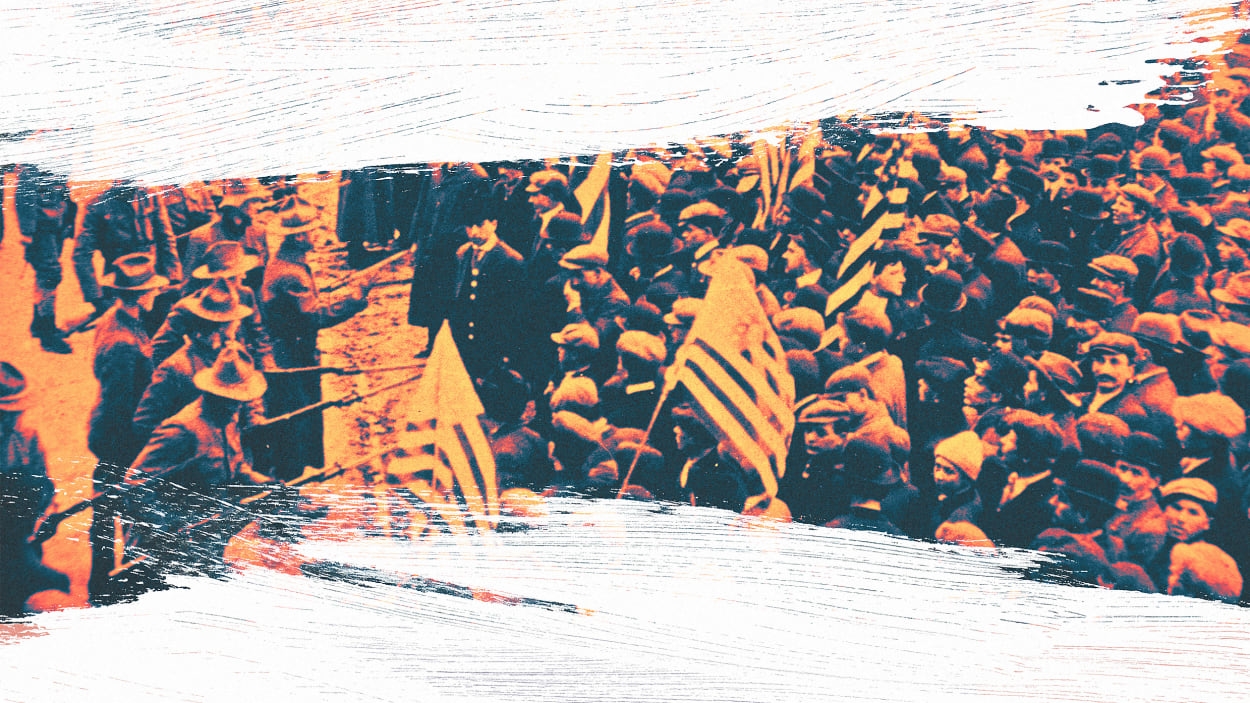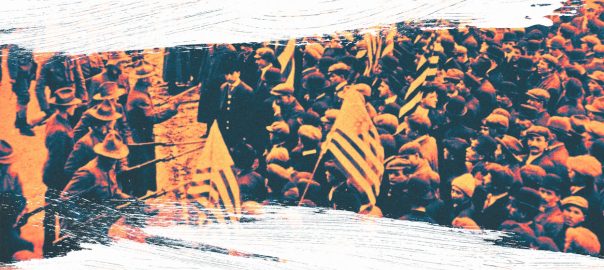By Kim Kelly
Every seven years, the commonwealth of Virginia is required to update its history and social studies education standards of learning. Once adopted, that framework sets expectations for what students will learn and be tested on during their K-12 tenure. The bureaucratic process is usually pretty quiet, but this year, in the midst of a Republican-cultivated panic over education, it turned into a national story. And among the many different groups who criticized the proposed changes to the curriculum, labor unions were one of the loudest.
Critics—among them a coalition including the Virginia AFL-CIO and SEIU, the Teamsters, VEA, AFT, and AFSCME—said that the proposed standards glossed over the labor movement and took an explicitly capitalist, pro-business, anti-worker tack. As SEIU Virginia 512 Union President David Broder said via email, “Simply put, those in power don’t want to be challenged, so they’re trying to eliminate the history of working people because they’re terrified of the power of working people.”
For example, the proposed sixth grade unit on industrialization emphasized “the concentration of wealth and mass production that created goods at cheaper and faster rates, including but not limited to industrial leaders such as Andrew Carnegie, Andrew Mellon, and John D. Rockefeller” without mentioning the workers who created that wealth, the unions they organized, or the massive strikes that helped define the early 20th century.
Further down, on the topic of industrialization, labor is left out again—students were asked only to consider “rapid urbanization, the effects on living and working conditions, and the emergence of more leisure time and activities” with no mention of organized labor’s role in improving those very conditions.
After reading through these proposed standards, one might be forgiven for assuming the early 20th century, a famously active, productive, militant moment for the nation’s organized labor movement, was an absolute snoozefest for the American worker. One section on the Progressive Era sailed by without mentioning unions, either; the focus was solely on legislation, much of which was actually—wait for it—supported and pushed through by unions.
As a matter of fact, the term labor union appeared in the 68-page document only once (the previous, 2015 version wasn’t much better, but at least made explicit mention of the rise of labor unions during the Progressive Era). Under the proposed standards, a student could have made it through their entire elementary school career without gaining an understanding of the huge impact that the labor movement has had on American history . . . or even learning what a union is. As Eric Pacheco, a member of IBEW Local 26 and father of three students, said during a recent hearing on the matter in Mount Vernon, “We don’t need less labor history. We need a whole lot more of it.”
The whole situation dates back to August. Former Governor Ralph Northam’s office had produced a 400-page version of the standards during his time in the role, but the Board of Education—now led by a five-member majority installed by current Governor Glenn Youngkin—rejected them.
Instead, they proposed a stripped-down, 53-page version that drew immediate criticism for a number of errors and evidence of right-wing bias, as well as critical omissions, particularly in Native and Black history. According to The Washington Post, that version “generally places less emphasis on the perspectives of marginalized peoples, removes suggested discussions of racism and its lingering effects, and promotes the workings of the free market, with limited government intervention.”
Stung, the board pulled back. Jillian Balow, Virginia’s now former superintendent of public instruction (she resigned without explanation on March 1, but continues to act as a consultant for Youngkin’s administration) came back in January with a revised third version that includes more content from the August version.
Balow’s year in office was dominated by her role in the standards fight, but she also made time to complain about critical race theory, a graduate-level course that is not taught in public elementary schools, and to end all equity initiatives at the Virginia Department of Education. (She also forgot to include Martin Luther King Jr. in the initial standards draft).
The Washington Post also reported that Balow received input from a number of outside groups, including conservative organizations like Civics Alliance, Thomas B. Fordham Institute, and Hillsdale College. While Balow insisted that the new standards honor recommendations from the African American History Education Commission, former commission member and current House District 19 candidate Makya Little called her bluff.
“What the Youngkin administration is doing is what the DeSantis administration is doing,” Little said in an interview with the Virginia Mercury. “They are just being more underhanded about it.”
Youngkin’s first executive order on January 15th name-checked critical race theory (which, again, is not taught in elementary or secondary schools) and pledged to purge Virginia’s public school system of “inherently divisive concepts.” It is a common right-wing politician’s tactic to obfuscate their true meanings behind mealymouthed generalizations, and that is exactly what Youngkin and his appointees are doing here.
The board held six public meetings between March 13 and 21 to hear comments and concerns. And some of the pushback had an effect, as the board voted on April 20 to adopt a slightly modified version of the controversial standards that added in a few more references to the importance of unions.
But still, labor history—and Black history, queer history, Native history, Asian history, and any other kind of history that does not easily fit into a simple historical narrative—was deemed too “divisive” to teach children, despite the fact that if they’d have been born a century earlier the children could have been working in the very factories that workers fought to unionize. As Brian Peyton, president of Teamsters Local 322, said via email, “Labor rights and labor history go hand in hand with civil rights and civil rights history.”
Kim Kelly is an independent journalist, author, and organizer whose writing on labor, politics, class, and culture has appeared in Teen Vogue, Rolling Stone, The Nation, The New York Times, The Washington Post, Columbia Journalism Review, and many other publications. Her first book, Fight Like Hell: The Untold History of American Labor, is out now via One Signal/Simon & Schuster. She is currently working on her second book.

(12)
Report Post







